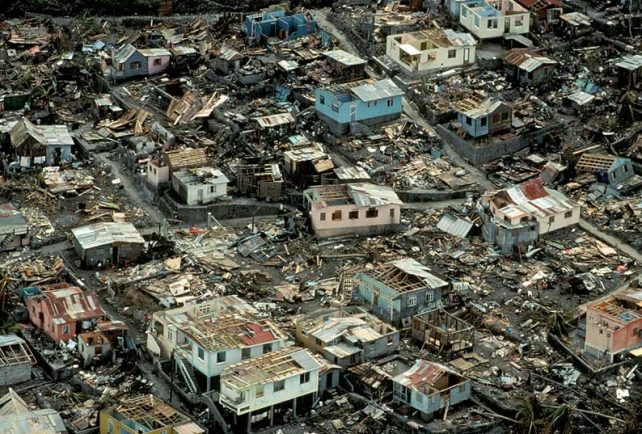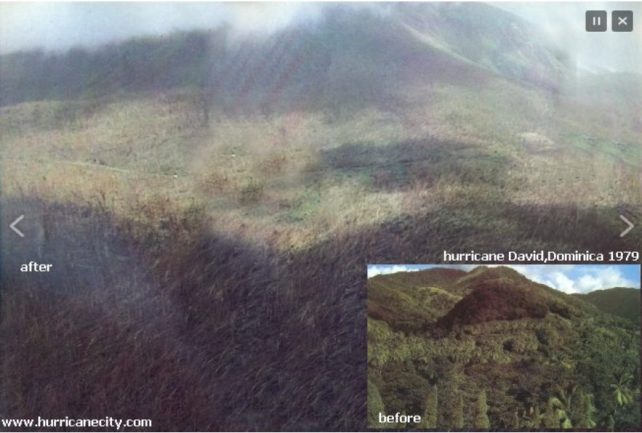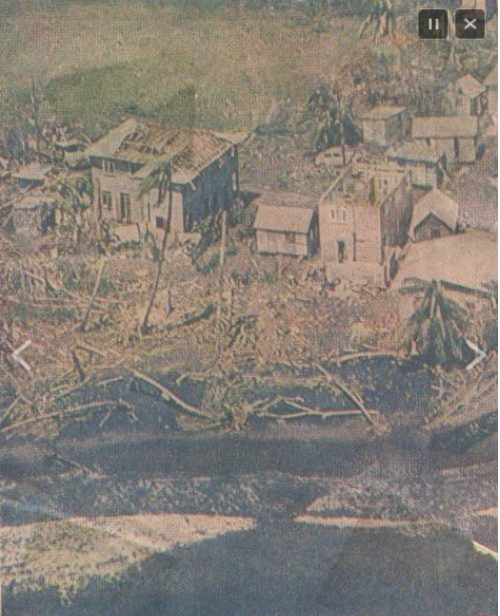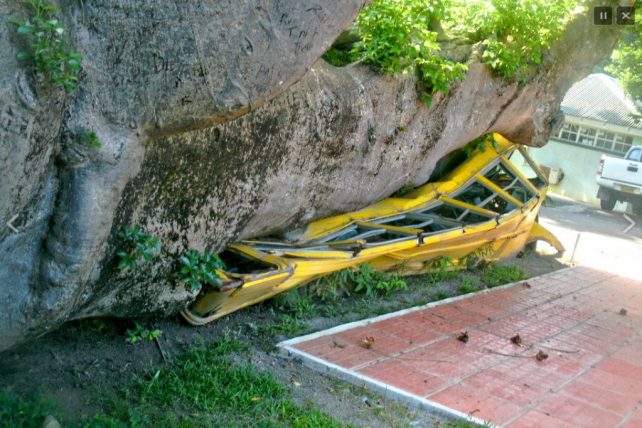
Forty-two (42) years ago, today Hurricane David, a Category 4 hurricane and one of the deadliest of the latter half of the 20th century, smashed into Dominica. Below are excerpts from three different accounts of the mammoth storm and its devastating effect on the island.
Dominica News Online (reference: The Dominica Story by Dr. Lennox Honychurch)
The island had only twice been previously struck by a severe hurricane. In a hurricane in 1806, 131 people died when the Roseau River shifted its course and flooded the capital. On September 10, 1834, 200 lives were lost as a result of what was to be known as the ‘Great Hurricane.’
Days before, forecasters predicted the hurricane would spare Dominica and hit Barbados instead. But hours before moving closer to the islands the hurricane shifted and headed for Dominica. Although it was clear David was coming residents did not appear to take the situation seriously.
Hence, the island was totally unprepared as there were little local radio warning and no systems in place for disaster preparedness. Packing winds of 150 miles-per-hour the hurricane pounded Dominica for six hours from 9:00 am.
Various reports put the death toll from the rampaging storm anywhere between thirty-seven and sixty-nine people and injuries at an estimated 5,000. Three-quarters of the population of 75,000 were left homeless. Many people slept in the open or huddled in homes of fortunate friends and neighbors for weeks or months to come.
The economy was totally destroyed, roads and bridges were blocked or swept away. Communications to the outside world were maintained only through Fred White’s battery operated ham radio until links were restored.
The Commander of a British Navy Frigate, which arrived in Dominica the next day, described the scene on the island as that of a bombed-out battlefield.
Dominica’s plight soon got swift attention from the Caribbean and the wider world. Food, tents, water and other supplies began arriving from the United States, Britain and Canada. Caribbean countries such as Barbados, Antigua and St. Lucia allowed temporary residence for scores of Dominicans who fled the island or who sent their children away until conditions improved.
The authorities struggled to restore some semblance of normalcy to the island. A food ration system was initiated. Foreign forces, contingents of the French Army, US Cee Bees and Royal Engineers set up camps here and assisted with relief efforts.
By November, Prime Minister Seraphin estimated that the pledges of assistance were at over US$37 million and that there was the probability of more in the long term. Assistance began pouring in from the IMF, International Red Cross, the Non-Aligned Movement, the Organisations of American States, the EEC and Caribbean Community States among others.
For months after the storm, the island echoed with the sounds of chain saws, hammering and electric generators as the people attempted to rehabilitate themselves.

Gabriel Christian – A historical and humanitarian perspective
The winds of David had smashed massive trees in our majestic forests like twigs and our mountains were now bare; most of the trees had been denuded of leaves by the driving wind and rain. Only the firm rock and soil of Dominica’s towering massifs had prevented more death and destruction to fall upon the cowering population which had sought refuge in every nook and cranny available to humankind.
However, on August 30, 1979, God and humankind smiled on us and our island received assistance in a manner most remarkable. This then is a brief commentary on faith, the resiliency of the human spirit, the kindness of nations and our ability to overcome.
Insult upon injury
It is often the case that we recall the worst of human nature, and forget the best. It also true, that in the course of human events, insult is oft times heaped upon injury. The truth is that on August 29, 1979, Dominica’s was a society just emerging from the worst political and social disorder in its recent history.
The worst part of it was that political tumult had splintered the country, and we were otherwise woefully unprepared to deal with a natural disaster of the magnitude which befell us. How could that be? A brief retelling is necessary here.
Barely ten (10) months earlier, on November 3, 1978, had Dominica attained independence from Britain. Prime Minister Patrick John was at the helm of a government led by the Dominica Labour Party; the Dominica Freedom Party of Eugenia Charles was the official opposition.
On the street and in the countryside, there was an insurgent left wing which was growing in strength and popularity. It was led by the likes of Michel Douglas, Bernard Wiltshire and Rosie Douglas of the Popular Independence Committees; Pierre Charles – newly elected President of the National Youth Council; Athie Martin of the Dominica Farmers Union and, William “Para” Riviere of the Peoples Democratic Party.
Elated, and with high hopes, Dominica had joined the United Nations. Most Dominicans, at home and abroad, were eager to prove we could do better than that which had been dished out to us by the “Mother Country” Britain over the centuries.
By January of 1979, the government was in trouble. A BBC investigative journalism program, Panorama had discovered that the Attorney General Leo Austin had been engaged in working with South African agents to set up front companies to evade the boycott of the apartheid regime then in power.
By February of 1979, protests erupted over the planned Free Port project in which Texan Don Pierson’s company was literally given hegemony over 45 square miles of the most fertile land in the island’s north in a manner which would supplant the authority of the national government.
Buffeted by protests, the government tried passing two bills; one to bridle the increasingly opposition-oriented trade unions such as the Civil Service Association led by Charles Savarin and the Waterfront and Allied Workers Union led by Louis Benoit; the other bill aimed to muzzle the press, now led by a Dominica Chronicle increasingly critical of government policy.
When the government sought to pass the bills into the law, fifteen thousand students, civil servants, workers, farmers and unemployed youth blocked the entrance to parliament at government headquarters on Kennedy Avenue in Roseau.
The Police force was powerless in its inability to restrain the crowd. Desperate, the government called on the Dominica Defence Force to clear the protesters.
On May 29, 1979, a day that will live in infamy, the Dominica Defence Force opened fire on its own people. In an unequal battle between the stone throwing citizens and soldiers; port worker Phillip Timothy fell dead and fifteen others were seriously wounded.
A days old baby – whose name remains unknown to history -died of tear gas inhalation. A general strike, alongside looting and burnings, followed. Patrick John’s government fell, to be replaced by that of Prime Minister Oliver Seraphine, who led a unity interim government comprising the remnants of the displaced Labour government from which he came, with elements from the Freedom Party and political left. Dominica had barely emerged from what was a social tempest of unprecedented ferocity, before the winds of David descended to wreak further havoc.

The Morning After
Early on the morning of August 30, 1979, citizens overcome by the anxiety that further disorder loomed and – with it – food scarcity, assaulted the External Trade Bureau food warehouse near our home in Goodwill and the warehouses which held imports at nearby Woodbridge Bay.
Luckily, the steadfast police Chief at the time, Oliver N. Philip, rallied his men and cleared away the looters with baton charges. An S.O.S to the world, telling of the disaster, had by then been sent out by the intrepid ham radio operator Fred White. But even more help was on the way.
Just off Woodbridge Bay, where high seas and soaring white capped waves still roiled the coast, a towering hull of British steel emerged from the grey mist of that sorrowful morning. It was the HMS Fife and its gallant crew; they were the first to arrive. Risking their lives, the men of the Fife had fought the hurricane’s treacherous aftermath to come to our rescue.
As my father gazed out the window of our house at the Fife, his colonial imprint which fondly recalled the ethic of Lord Nelson’s admonition that “England expects everyman to do his duty,” said: God Bless the Royal Navy! Though on leave, he quickly donned his fire officer’s uniform and took up his duty.
As soon as they could make it to the jetty, the sailors of HMS Fife scoured the city, treating the wounded, and securing temporary roofing for the Princess Margaret Hospital. I can see them now in my mind’s eye, clearing Bath Road and Queen Mary Street by hand; many bareback under the now blazing sun.
The ship borne helicopter off HMS Fife took to our skies, dropping emergency supplies to far-flung villagers who had been marooned by landslides and bridges which had been swept out to sea.
Then the United States came in on a massive scale. US Navy Engineers, the famous “Seabees” landed bulldozers and John Deere tractors by landing craft at Fond Cole beach. Huge twin shaft Chinook helicopters set up their base at the Windsor Park, disgorging tons of C-rations.
The C-rations, all in olive green cans or plastic wrapping, were a cornucopia of pound cake, frankfurters, corn beef hash, chicken hash, tuna, cheese, crackers, and even fruit cake. Strapping US soldiers, in full combat gear surrounded the perimeter of the Windsor Park and started stacking the food and medical supplies, as the population, still shocked by the enormity of the disaster, looked on.
Generally, our people were immobilized by the scale of the loss. Poor planning and the recent political discord left our people ill prepared for the task at hand. Our survival, literally resided in the generosity of nations.
From South America, Venezuela under its President Carlos Andres Perez, was at forefront. The Venezuelan Armada landed bulldozers in Roseau to assist in clean-up as well; while in the north, Venezuelan Air Force C-130 Hercules Aircraft landed at Melville Hall and literally took-over operations and air traffic control.
The Venezuelan Air Force discharged French-made Alouette helicopters with a peculiar tinny sound to drop off food supplies, and ferry the wounded to hospital. So much help was rendered in terms of food aid that – often times- food spoiled. On Leblanc Lane in Goodwill, the Venezuelan Army stored 100 pallets with cartons of eggs in the basement of an empty house for later distribution.
With the electricity grid down, most of the eggs went bad in days. By day two, the French navy also had its choppers in the air and the French Army secured Pottersville Savannah as it base, from which to render assistance. By day three, the Royal Marines had also landed and set up base at the citrus packing plant in lower Goodwill. All the powers, in their quest to rescue Dominicans, worked in the spirit of amity.
Within days our Caribbean Community neighbors sent all they could; my memory of blue-shirt clad Jamaican Coast Guard men unloading supplies under the stern of smartly dressed officer, remaining vivid in my mind to this day. Ration cards were handed out, but food was so plentiful that it was never really “rationed” in the true sense of the word.
It needs remarking that this was time of the Cold War; a time when East and West often competed for the support of the newly independent nations. The Non-Aligned Movement (NAM) was meeting in Havana under Fidel Castro’s chairmanship. Rosie Douglas and Bernard Wiltshire were sent to Havana as emissaries of the interim government to secure assistance from the NAM.
Thirteen millions dollars were pledged by NAM members, from as disparate sources as Ayatollah Khomeini’s Iran, Saddam Hussein’s Iraq and Yasser Arafat’s Palestinian Liberation Organization. The NAM sent Grenada’s new revolutionary leader Maurice Bishop and Cuban Trade Minister Hector Rodriguez Llompart on a special mission to Dominica to assess the needs of the island.
Alvin “Alo” Bernard and I, as members of the Popular Independence Committee were part of the welcoming committee for the delegation. In a special session at Springfield Guesthouse, the Cubans offered a 500 bed hospital, 100 university scholarships and $1 million US dollars in immediate assistance. The fractious government accepted the money and eleven scholarships; the hospital was put on hold.
This was also the time when Dominicans in the UK, US , USVI, the French Territories and Canada came to the fore in packing boxes of food, clothing and medical supplies for their kindred. That coming together in noble endeavor by our Diaspora populations birthed new organizations and is fondly recalled to this day.
Indeed, the evil winds of David had blown down material things, and laid our nation low. However, in an ironic twist it brought other nations to our rescue and their implements of war were beaten into plowshares which cultivated a new love for our common humanity – if only for that moment.
People went to church and were reassured by a resilient Christian faith that, by worthy effort, better would come. Our interim government struggled to maintain its unity of purpose and worked well enough to usher in free elections in July 21, 1980. Eugenia Charles’ Freedom Party government came into office and ushered in fifteen years of political stability which we continue to enjoy today.
As we look back at that time when our preparedness was found wanting, may we constantly hone our disaster relief skills, by uniting the various services: police, fire, nursing, cadets, scouts and guides movement, Diaspora organizations and Red Cross into an effective vehicle to serve the nation at times of need.
Forty-two years later, all Dominicans should pause and reflect for a moment on how fortunate we have been and how blessed we were to have been given a hand-up by those far and near, when we had stumbled along the way and nature laid us low.
We should all pay tribute to those who rendered meritorious service in the aftermath of Hurricane David. In particular, we honor those nations which forgot the rivalries of the Cold War and joined in common noble endeavor to restore a young and fragile nation. May we always remember them and show the gratitude which is rightly due.



Gabriel, thanks for the juxtaposition of the the political situation with the disaster. It makes for a very interesting read, indeed.
Great the we pause to remember David. Sadly though Erika which was just six years ago seem to have been forgotten. I still shiver at the thought of so many lives lost.
Historians are always an invaluable gift to a nation. We’re forever grateful for their recapping of epic moments such as these in the course of time.
This article is interesting and informative!